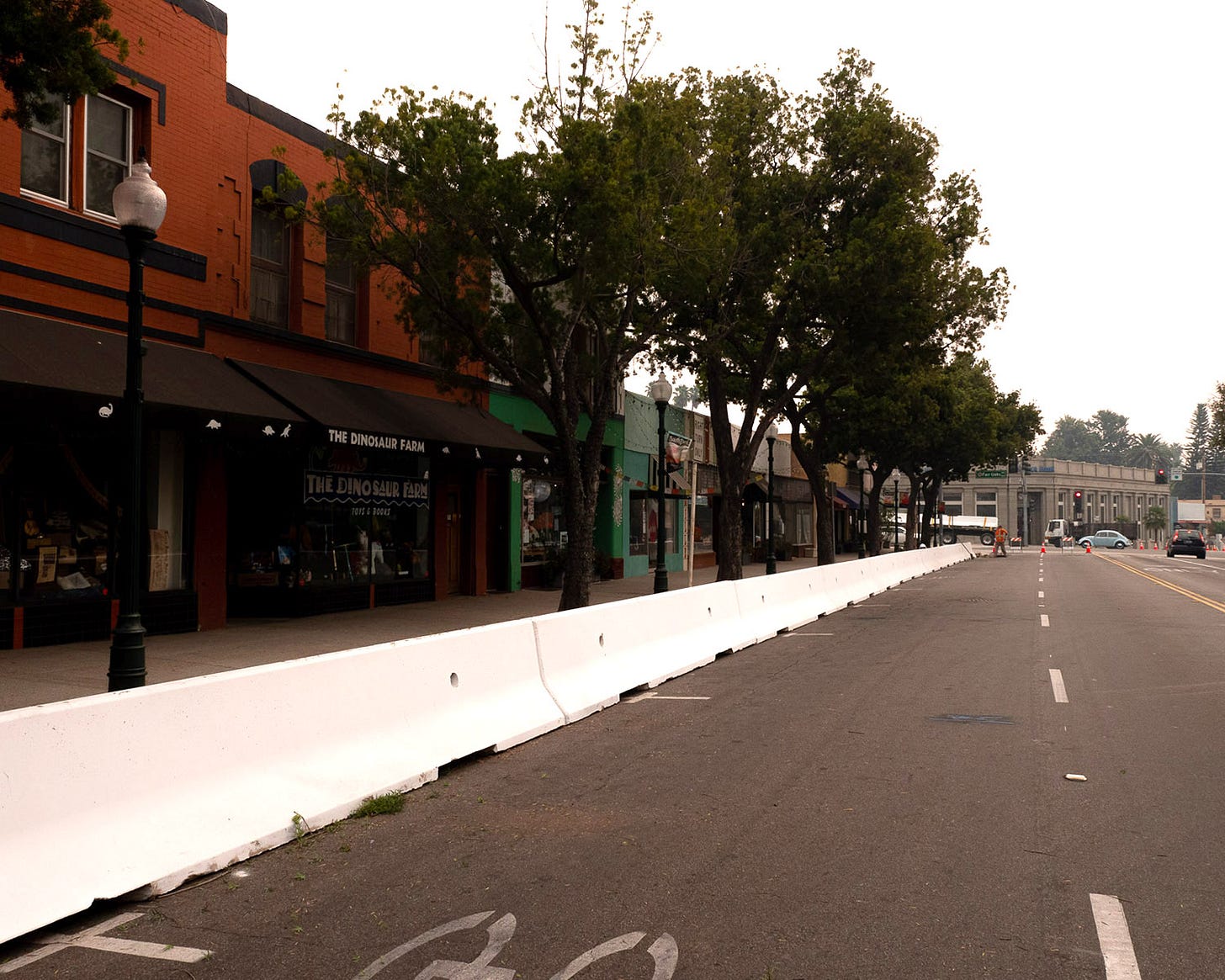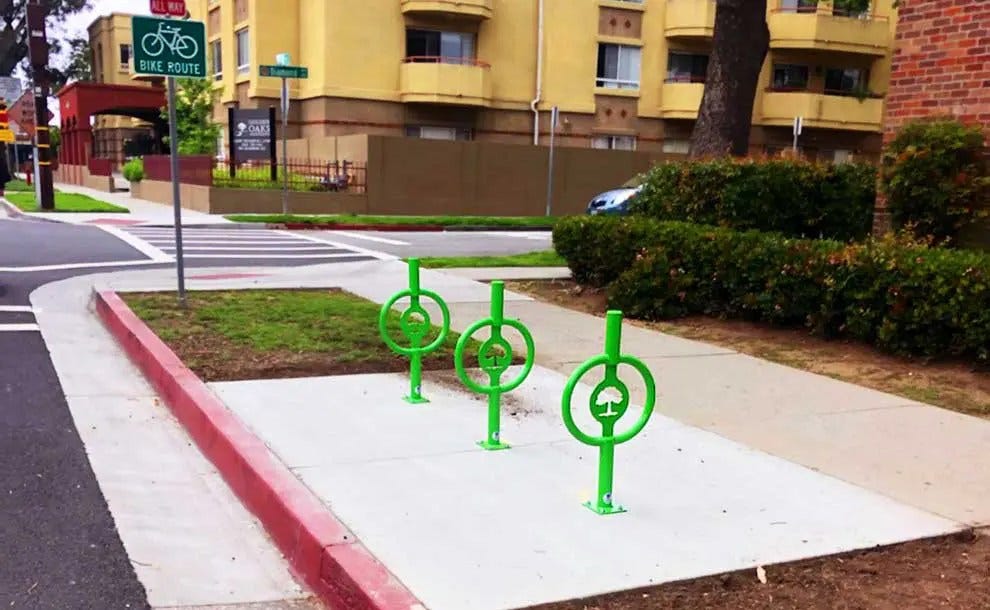Sophisticated Symbolic Performer Encounters Shoelace, Is Baffled By Resulting Task
This story has to start with the K-rails, and keep this image in mind.
During the worst of the pandemic measures, restaurants in California were unable to serve customers indoors. They turned to take-out and delivery service to survive, but lost their core business. So cities all over the state did something that was actually kind of pleasant, closing main streets and putting up concrete barriers to create pedestrian-friendly outdoor dining areas where restaurants could “safely” — yes, eye roll — serve their customers.
Beach towns kind of crushed this, and — during a period of enforced social isolation and manufactured loneliness — it was awesome. I drank a lot of beer in the street. To fight the virus.
I live in a small suburban town, South Pasadena, that is, how do I put this politely, kind of culturally like Ojai. I’ll let you figure out what I mean by that while I stand here whistling quietly and avoiding eye contact. Slowly, awkwardly, our city government followed the parade, and decided — after everyone else did it — to put some concrete barriers in the street so restaurants could transition to a larger adoption of outdoor dining than their existing patio or sidewalk space allowed. Like many cities, this one opted against a full closure of our main downtown street, and decided instead to create a few outdoor dining areas covering portions of a single traffic lane.
They fucked it up. This should not be possible, but they made it into a minor disaster. Here’s a fairly polite description of the event, a local news story from the day when a contractor showed up and put down the K-rails — the concrete barriers — on our little stretch of a downtown main street. The contractor dumped the barriers in front of shops that aren’t restaurants and had no business they wished to conduct in the street, costing them their storefront-adjacent parking for no clear reason. Restaurants that wanted the things didn’t get them, or got them in the wrong place. And business owners expressed surprise to see the barriers, saying that no one had told them they were coming — they just showed up for work one morning, and found barricades in front of their stores. Thanks?
Here’s a long stretch of lost parking in front of a toy store and some clothing stores, a helpful gift from a local government to help the toy store improve its al fresco dining program:
A great deal of scrambling followed, at extra expense, as angry business owners called city officials and demanded that they get that shit out of the street in front of my store; the contractors returned for an extra day of paid work.
The entire city is 3.4 square-miles, and that little stretch of a main street is a very few blocks long, with City Hall parked more or less in the middle. Fumbling the placement of some concrete barriers in that context is like digging a hole in your own front yard to plant a tree, and then putting the tree ten feet away from the hole, and then lighting the tree on fire, and then falling into the hole; it was, ladies and gentlemen, a fairly simple task. And it was completely botched. This kind of outcome can only be the result of an absolutely determined inattention to ordinary detail.
We play versions of this scene often. In 2013, the city got grant funding from the state to install bicycle racks around town; here’s a news story from six years later about city officials scrambling to avoid losing the funding, because they hadn’t had time to actually install the racks, yet. “Schneider urged Shahid Abbas, the city’s public works director, to push hard over the next several months to meet the April 1, 2020 deadline.” We have to push hard to install several dozen bike racks in just seven years.
Now. Here’s part two: That same city government has a climate action plan. The South Pasadena City Council will not allow the oceans to rise. We talk about it endlessly; it’s the very heart of our city government. We control the earth.
Consistent with a new state law, we’ve decided that we’re no longer going to allow our orange peels go to the landfill, because they take up space and produce methane that hurts the climate, so we’re going to replace our existing city garbage program with a program that offers a more-intensive focus on proper sorting. It will be more expensive, and less convenient, and will require a complex transitional period and a retrofitting of trash trucks — if not an entirely new organic-waste-focused secondary trash fleet — but your discarded shallots will be centrally composted, and that’s important.
Meanwhile, our police department, which consistently maintains a response time for serious emergency calls that hovers close to a single minute, is problematic, because the cops respond to those emergencies using internal-combustion engines. Your domestic partner may be beating the shit out of you, but that’s no excuse for using fossil fuels. (Stop being so selfish!) A management team from the South Pasadena Police Department is analyzing the possible transition, touring and testing to prepare for the switch to an all-electric patrol fleet. California, by the way, has increasingly frequent blackouts, but whatever.
Our last policing controversy was tied to a similar problem, as we considered whether or not we wanted police to make misdemeanor arrests of gardeners to enforce our new ban on gas-powered leafblowers — which cause climate change. After two separate council debates and an extended period of staff analysis, thank the heavens, we decided to apply only a civil penalty to the use of the wrong gardening tools.
And finally, our city council just voted to make electric power significantly more expensive to local businesses, so we can pretend we’re getting all of our electricity from windmills and the sun. In exchange for higher utility bills, the city promises, businesses will receive clean energy “web badges” and a free listing in a “Green Leaders directory.”
A small-town city government that needed seven years to install bicycle racks, a task that produced panicked scrambling before we barely managed to complete it, is taking direct charge of the climate of the earth. Our lawyer-majority city council, endlessly performing their symbols, struggles with tasks that are simple and proximate, but finds the average temperature of the planet in future centuries well within the boundaries of its direct control.
The spectacle of a ritual-focused governing class — I refer you again to this essay on “the Physicals and the Virtuals” and the problem of “luxury Gnosticism” — isn’t just a phenomenon of national and global politics. It’s everywhere, strangling our ability to manage ordinary tasks. We put the K-rails in the wrong place because the real physical objects we’re putting in the actual street are afterthoughts; we were working on our climate action plan. Little by little, reality erodes. Actual services and facilities, real things in real places, degrade.
Until they can’t anymore.




This was hilarious. Reminds me of the local going-ons in Vermont. It is now illegal to throw food in the trash. You must compost it or put it in a separate food trash bucket. Unless you don’t want to, of course, as the “law” has zero enforcement provisions. Thank god. Meanwhile in Burlington, the homeless are murdering each other but the city council has voted to legalize prostitution. (It’s still against state law, though, lest folks start flocking here for maple flavored prozzies.)